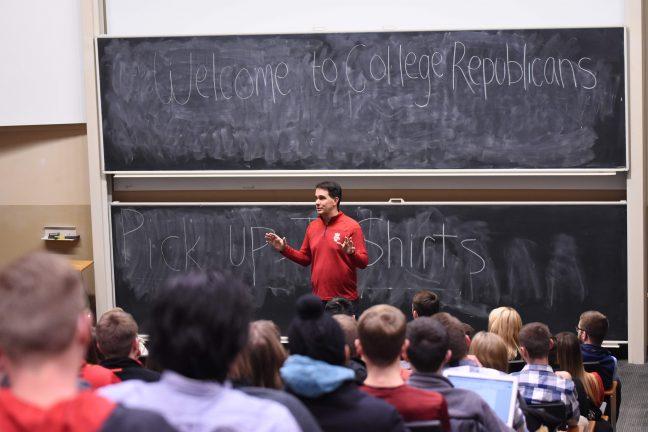Gov. Scott Walker spoke words of optimism for the Republican party to a packed auditorium of University of Wisconsin College Republicans Wednesday night.
Walker reiterated many of the points from his State of the State address given two weeks prior, citing “historic” employment numbers, investments in education and people moved off welfare.
Republicans can win in Wisconsin by spreading these facts, Walker said.
“We’ve got a powerful story to tell,” Walker said. “We can win not by matching anger but rather by matching our optimism and being organized.”
The Democrat’s upset victory in northwestern Wisconsin on Jan. 16 of this year — where a Democrat unseated a Republican in a district which has historically voted Republican — was a “wake-up call” for Republicans, Walker said.
Senate District 10 special election win by a Democrat is a wake up call for Republicans in Wisconsin.
— Scott Walker (@ScottWalker) January 17, 2018
Walker said his biggest fear for the party is complacency, and it is the job of people across the state, including College Republicans, to engage with those they disagree with.
“You can rationalize [the upset] in a number of ways, but it really was a wake-up call about how we can’t presume that our neighbors, our classmates, the folks you live down the hall from … know about the good and positive things we’ve done for the people of the state,” Walker said.
Walker also promoted his recent proposal to reform welfare.
His proposal would require able-bodied parents on food stamps to work in order to receive more than three months of benefits and increase work requirements for all beneficiaries from 20 hours a week to 30 hours a week, according to the Milwaukee Journal Sentinel. It would also require all welfare recipients pass a drug test to receive benefits, according to a press release.
“The way the welfare system has been set up, it all too often encourages people who are on assistance to stay on assistance,” Walker said. “I’ve often said, I’m willing to help people out, but public assistance should be more like a trampoline and less like a hammock.”
The existing requirement enforcing 20 hours of work per week to receive benefits, which has been in place since 2013, has led to 3.5 recipients losing benefits for each person who has secured a job through the program, according to the Sentinel. It is unknown whether people who lost benefits found a job later, the report said.
Walker reassured the crowd that Republicans at UW, a liberal campus, can affect real change.
He cited UW’s tuition freeze for six years in a row as an example of the right’s victory on a left campus.
“You can make a difference right here on this campus,” Walker said. “You take a few points off the margin here and that can be the difference in a close election.”
Walker said if he were re-elected he would “absolutely” reintroduce a proposal to end mandatory segregated fees for many organizations at UW.
Food services and recreational sports are legitimate reasons to make all students pay a fee for, but forcing all students to contribute to organizations they “inherently” don’t agree with doesn’t make sense, Walker said.
Walker lauded other achievements Republicans have made in Wisconsin, like Foxconn building a factory in Racine County. Walker said he was proud companies are investing in Wisconsin and said it will help small businesses in the long run.
Going into the election year, Walker said he predicts Democrats running for his seat this year will be forced to go further left to compete.
“Strategically, that’s probably a good thing for us,” Walker said.


